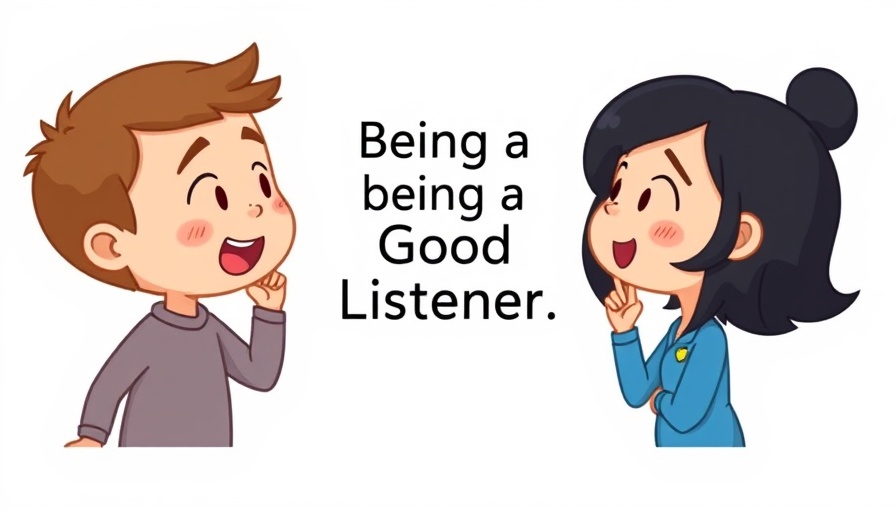
Understanding the Importance of Listening in Family Dynamics
As parents, fostering open communication can transform relationships and help you support your children's emotional well-being. One key aspect of effective communication is the ability to listen deeply. This means not just hearing words, but understanding the emotions behind them. When parents practice active listening, they encourage their children to express themselves openly, fostering a nurturing environment.
The Four Essential Qualities of a Good Listener
Based on expert insights, there are four fundamental qualities of a good listener that every parent should cultivate:
- Asking Thoughtful Questions: Encourage your children to share their thoughts by asking questions like, "What's on your mind?" This type of inquiry signals that you care about their feelings and thoughts, especially during tough decision-making moments. This approach can also help children clarify their feelings and concerns.
- Going Beyond Small Talk: Children often express emotions in vague terms. Good listeners help bridge the gap between a child's anecdotes and their underlying feelings or concerns. This quality can help in understanding the bigger picture of their emotional lives.
- Embracing Individual Uniqueness: Each child is different, and good listeners recognize and celebrate this uniqueness. Allowing children to be vulnerable without fear of judgment helps foster a sense of safety in expressing emotions.
- Separating Disagreement from Criticism: Sometimes disagreements are inevitable, but a skilled listener can communicate that differing opinions will not affect their relationship. This openness encourages children to be honest in their communication.
The Role of Listening in Mental Health
In today's world, mental health is a paramount concern. Studies consistently show that strong familial relationships support mental well-being. Good listening is directly linked to reduced feelings of isolation in young people and promotes resilience against various problems like anxiety and depression. By being attentive listeners, parents can help their children navigate the challenges of adolescence and beyond.
Bridging Communication Gaps in Times of Crisis
During challenging times — for instance, when a child faces issues related to substance use — listening becomes even more crucial. Experts agree that communication can be a lifeline. Practicing active listening not only assures children that their feelings are valid but may also guide them towards healthier lifestyle choices. Open lines of dialogue can become a platform for discussing important issues such as addiction treatment and preventive measures.
Navigating the Conversation Around Substance Abuse
Talking about substance use can be daunting for parents. Starting with open-ended questions and empathetic listening can bridge this intimidating gap. Knowledge about local addiction treatment options can empower parents to guide their kids if they face such challenges. Facilities in areas like Johannesburg and Cape Town offer various programs that cater to different needs, such as inpatient rehab and outpatient options, ensuring that help is accessible.
Practical Tips for Effective Listening
To strengthen your listening skills, consider implementing the following strategies:
- Be Present: Put down your phone and give your child your full attention during conversations.
- Reflect Back: Restate what your child has said to confirm understanding and show empathy.
- Practice Patience: Allow moments of silence, where your child might gather their thoughts before speaking.
- Encourage Sharing: Promote an environment where sharing is welcomed and non-judgmental.
Conclusion: Nurturing the Listener Within You
In an age where distractions are everywhere, honing the qualities of a good listener is essential for parents. Not only does it benefit familial relationships, but it also plays a critical role in supporting children’s mental health. By embracing active listening, you become a pillar of support, fostering communication and resilience. If you want to learn more about substance abuse prevention and support resources, consider reaching out to local facilities to gather information pertinent to your family's needs.
 Add Row
Add Row  Add
Add 




 Add Row
Add Row  Add
Add
Write A Comment